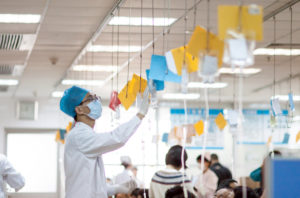Giving birth in any country is a momentous decision, but even more so when you are far away from home and lack access to clear information. We asked Dr. Sophia Chin, Physician Teaching Director at American-Sino OB/GYN, 8 questions about having a baby in China.
1. How long do I stay in hospital after the birth?
Mothers who’ve had uncomplicated vaginal births will typically stay in the hospital for two nights and those who’ve had uncomplicated Caesarean deliveries stay three nights.
2. Will my husband be allowed in the room if the birth is a C-section?
Depends on the institution’s policy but usually if the Caesarean is non-emergent then at American-Sino OB/GYN, absolutely!
3. If my water breaks, how much time do I have to get to the hospital before the delivery?
No one knows for sure, since each patient situation is different. The best thing to do if you think your water is broken is to call your obstetrician to get evaluated.
4.I want a natural birth with no drugs, am I still required to have an IV line?
If you are low risk with no complications during the pregnancy, then I recommend having an IV line that is not hooked up so in case of emergency, valuable time is not wasted placing the IV.
5. I am pregnant and worried about bird flu? Are there any things I should do or avoid to stay safe?
Avian flu is mostly spread through airborne transmission. Currently, the virus is transmissible to humans only from infected poultry and there is no evidence it is spread human to human.
Avoid contact with infected poultry, poultry markets, and live birds, and ensure that all poultry products are thoroughly cooked. Frequent hand-washing while preparing poultry is also important to minimize contamination.
When handling poultry or eggs, wash your hands with soap and warm water for 20 seconds before and after and cleaning cutting boards or any utensils used prior to contact with any other foods. Use a food thermometer to ensure poultry is cooked to a temperature of at least 73 degrees Celsius or 165 degrees Fahrenheit. Eggs should be thoroughly cooked so both whites and yolk are firm.
6. Can I get “safe” baby formula in China or should I buy imported only? What brands do you recommend?
Breast feeding is the best way to feed your baby naturally and safely.
7. What is a doula? How does a doula work together with hospital staff?
Doula is a word which originates from ancient Greek, meaning a woman who serves. These days, a doula is a non-medical person who guides and supports the patient throughout labor, delivery, and the postpartum period. Their primary goal is to enhance the patient’s confidence and feeling of safety.
Although many doulas have prior medical experience as a nurse or midwife, they do not make medical decisions or offer medical device. They do offer compassionate encouragement as a labor companion and are therefore great additions to the hospital staff. Research shows doulas improve the birth experience for most mothers and can decrease the pain.
8. Are VBAC (vaginal births after Caesarean) births allowed in China? Are they advisable?
VBACs are allowed in some institutions in China and are a great option for the right patient. Studies suggest VBAC overall success rate is approximately 60% (some studies show even higher rates of success) and should be considered in women with one prior low transverse Caesarean section. The decision to attempt VBAC is individualized and based on your medical history and current pregnancy.
Benefits of successful VBAC:
- Generally decreased recovery time and hospital stay
- Reduced risk of thromboembolism (blood clot in the leg or lung)
- Reduced risk of needing a blood transfusion
- Ability to avoid risks associated with repeat caesarean sections
- Ability to have future vaginal births after this pregnancy
Risks of attempted VBAC include but are not limited to:
- Uterine ruptures occur in less than one percent for women laboring for a VBAC compared to less than 0.1 percent for women who have a planned repeat caesarean.
- If uterine rupture occurs:
- An emergency Caesarean section will be necessary and a midline vertical skin incision may be necessary.
- The risk of infant death or permanent damage to the infant increases.
- A hysterectomy (removal of the uterus) may be required in the event of a hemorrhage (severe bleeding).
- If an emergent Caesarean section is required, a general anesthetic maybe given. This carries more risk to you and your infant than spinal or epidural anesthesia.
- Failure of VBAC attempt and need for repeat Caesarean section.
Benefits of a repeat Caesarean section:
- Scheduled delivery
- Ability to perform tubal ligation at same time
- Avoiding risks of failed VBAC
Risks of repeat Caesarean section include but are not limited to:
- Bleeding, infection, and damage to adjacent structures (i.e. bowel, bladder, vessels, and nerves) as can occur during any surgery
- Abnormal formation of the placenta (when the placenta attaches deep inside the uterus or the uterine scar) in future pregnancies. This risk increases in conjunction with the number of caesarean sections. Abnormal placenta formations increase the risk of hemorrhage and hysterectomy
- Scarring after surgery leading to residual discomfort or pain in the future
- Need for future pregnancies to be delivered by Caesarean section
Talk with your obstetrician if you want to attempt VBAC during the first prenatal visit. It’s better to know at the beginning whether the physician or institution performs VBACs and if this option is right for you. There are many individualized factors that influence this important decision; receiving professional advice as early as possible gives to time to obtain a second or third opinion if necessary, and transfer care at your convenience.
Sophia Chin joined American Sino OB/GYN in 2013. Previously she was Senior Partner at a private practice in Lutheran General Hospital in Chicago. She is board certified by the American Board of Obstetrics and Gynecology (ABOG) and is a fellow of the American Congress of Obstetrics and Gynecology. In addition, she holds active memberships with the American Association of Gynecologic Laparoscopists and American Medical Association. She completed her medical training at the University of Illinois, Chicago.




Leave a Comment